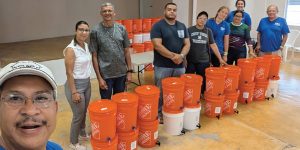
Interview by Tere Siqueira
A Kansas City area Latino is among the health professionals helping to fight the coronavirus (COVID-19) pandemic.
Manuel Solano, M.D., who graduated from medical school and did his residency in psychiatry in Colombia, is program director for the Community Health Council of Wyandotte County (Kansas). His other posts have included serving as executive director of behavioral health for the Samuel U. Rodgers Health Center.
Recently, the doctor, who also has been a part of advisory committees at the state level for workforce development, shared his insights about COVID-19.
Dos Mundos: Can you explain what … the coronavirus (is)?
Manuel Solano: Many germs can affect human health. Between those germs, there are different qualifications. It’s a virus that was transmitted from animals to humans. This is a virus that initially affects the respiratory tract.
The virus is really small, small enough that (a) face mask can’t stop it. However, the masks can protect the virus to not go that far. The virus is transmitted through the mouth, nose or eyes. That is the most common way of getting infected. The virus causes symptoms similar to the flu, even … (though) it belongs to another family. But the disease starts like (the) flu.
The problem is that this is a new virus. No one has a defense against it.
DM: Why do you think that the virus (has) affected the U.S. in a bigger way (than other countries)?
MS: The main problem is that we don’t have a defense against the virus. When we are children, (the) more (a) virus affects us. That’s why kids get sick frequently when they start going to school. This is because the virus is usually in the environment.
As we get used to being exposed, we acquire immunity. We become resilient to viruses. So the next time we get sick, we don’t get affected that hard. But when a new virus appears, we don’t have any kind of defense. That’s why COVID-19 has increased its transmission … (around) the world. No one has been exposed to this before. That’s why we have many cases in the U.S. and the world. That’s why it’s called a pandemic because it’s everywhere.
DM: Why do you think that (the) coronavirus is affecting Latinos in the U.S. in bigger numbers?
MS: In these moments, we don’t have an explanation. Statistically, we know that (it) is affecting … more Latin and African Americans disproportionately. Even when there isn’t a scientific reason to prove why, we know that there are many reasons that make Latins more exposed to the disease. Latinos tend to suffer more from diabetes, hypertension and suffer from more frequency of asthma diseases.
All these predispositions elevate the chances of getting infected. In California – the place with more research about this – the mortality rate, people that die after getting sick, it’s much bigger than the general population. Some explanations link the numbers to the social determinants of health, which include your ZIP code, how many people live in the house and the level of poverty.
DM: How can people avoid getting infected and stay healthy?
DS: The most important (step) is to follow the Centers for Disease Control and Prevention (CDC) recommendations. But as we know, the virus will move through (a) cough and (a) sneeze. We should keep social … distancing. Don’t touch your face, nose and ears, especially when you are in an environment with more people. The best way to protect others is by using a mask and washing your hands frequently. If you use a mask, the probability of contagion reduces.
DM: What should you do if you are sick?
MS: If you … (think) that your life … (is at) extreme risk, call 911. You need to call the hospital if you feel that the situation … (cannot) wait. … That way, they will be prepared. They will offer you immediate help and you won’t have to wait in the emergency room, … where you can put your and others’ … (lives at) risk. If you have any of the specific symptoms (fever, cough, difficulty breathing, chills, muscle and throat pain, headache, loss of taste and smell, and/or diarrhea) but you feel stable, … you need to call your doctor. If you don’t have one, you can call the Department of Health of Wyandotte at 311 and they will send you to the right place.
DM: Do you have a message for the Latin community … (in) Kansas City?
MS: Please don’t let … (your) guard down. In the fall, there will be a second wave of the disease.
History can be a reference. The Spanish flu in 1918 was a pandemic with similar symptoms. Back … (then), people let their guard down. As a result, the second wave caused more deaths than the first one.
People need to understand that, even when (the) numbers slow down, the pandemic is not over. The weather is changing, but as soon as the weather gets colder, … the scientific predictions show that it will come back. If we aren’t prepared and don’t follow the instructions, we will have more people infected and more deaths in the community.
____________________________________________________________________________________________________________
Médico informa sobre el coronavirus
Un latino del área de Kansas City se encuentra entre los profesionales de la salud que ayudan a combatir la pandemia del coronavirus (COVID-19).
Manuel Solano, M.D., quien se graduó de la escuela de medicina e hizo su residencia en psiquiatría en Colombia, es director del programa del Community Health Council of Wyandotte County (Kansas). Sus otros puestos incluyen el servir como director ejecutivo de salud del comportamiento para el Centro de Salud Samuel U. Rodgers.
Recientemente, el médico, que también ha sido parte de comités asesores a nivel estatal para el desarrollo de la fuerza laboral, compartió sus puntos de vista sobre el COVID-19.
Dos Mundos: ¿Puedes explicar qué es el coronavirus?
Manuel Solano: Muchos gérmenes pueden afectar la salud humana. Entre esos gérmenes, hay diferentes calificaciones. Es un virus que se transmite de animales a humanos. Este es un virus que inicialmente afecta el tracto respiratorio.El virus es realmente pequeño, lo suficientemente pequeño como para que los cubre bocas no puedan detenerlo. Sin embargo, los cubre bocas pueden proteger al virus para no llegar tan lejos. El virus se transmite a través de la boca, la nariz o los ojos. Esa es la forma más común de infectarse. El virus causa síntomas similares a la gripe, aunque pertenece a otra familia. Pero la enfermedad comienza como una gripe.
El problema es que este es un nuevo virus. Nadie tiene defensas contra el.
DM: ¿Por qué crees que el virus (ha) afectado a los EE. UU. de una manera más grande (que a otros países)?
MS: El principal problema es que no tenemos una defensa contra el virus. Cuando somos niños, el virus nos afecta. Es por eso que los niños se enferman con frecuencia cuando comienzan a ir a la escuela. Esto se debe a que el virus generalmente está en el medio ambiente.
A medida que nos acostumbramos a estar expuestos, adquirimos inmunidad. Nos volvemos resistentes a los virus. Entonces, la próxima vez que nos enfermemos, no nos afectaremos tanto. Pero cuando aparece un nuevo virus, no tenemos ningún tipo de defensa. Es por eso que COVID-19 ha aumentado su transmisión … alrededor del mundo. Nadie ha estado expuesto a esto antes. Es por eso que tenemos muchos casos en los Estados Unidos y el mundo. Es por eso que se llama una pandemia porque está en todas partes.
DM: ¿Por qué crees que el coronavirus está afectando a los latinos en los Estados Unidos en mayor número?
MS: En estos momentos, no tenemos una explicación. Estadísticamente, sabemos que está afectando … a más latinoamericanos y afroamericanos de manera desproporcionada. Incluso cuando no hay una razón científica para demostrar por qué, sabemos que hay muchas razones que hacen que los latinos estén más expuestos a la enfermedad. Los latinos tienden a sufrir más de diabetes, hipertensión y sufren más frecuencia de enfermedades de asma.
Todas estas predisposiciones aumentan las posibilidades de infectarse. En California, el lugar con más investigaciones sobre esto, la tasa de mortalidad, las personas que mueren después de enfermarse, es mucho mayor que la población general. Algunas explicaciones vinculan los números con los determinantes sociales de la salud, que incluyen su código postal, cuántas personas viven en la casa y el nivel de pobreza.
DM: ¿Cómo pueden las personas evitar infectarse y mantenerse saludables?
DS: Lo más importante es seguir las recomendaciones de los Centros para el Control y la Prevención de Enfermedades (CDC). Pero como sabemos, el virus se mueve a través de la tos y estornudos. Debemos mantener la distancia social. No te toques la cara, la nariz y las orejas, especialmente cuando estás en un entorno con más personas. La mejor manera de proteger a los demás es usar cubre bocas y lavarse las manos con frecuencia. Si usas una máscara, la probabilidad de contagio se reduce.
DM: ¿Qué debes hacer si estás enfermo?
MS: Sí piensas que su vida está en riesgo extremo, llame al 911. Debe llamar al hospital si siente que la situación no puede esperar. De esa manera, estarán preparados. Le ofrecerán ayuda inmediata y no tendrá que esperar en la sala de emergencias, donde puede poner a usted y a los demás … en riesgo. Si tiene alguno de los síntomas específicos (fiebre, tos, dificultad para respirar, escalofríos, dolor muscular y de garganta, dolor de cabeza, pérdida de sabor y olfato, y/o diarrea) pero se siente estable, debe llamar a su médico. Si no tiene uno, puede llamar al Departamento de Salud de Wyandotte al 311 y lo enviarán al lugar correcto.
DM: ¿Tiene un mensaje para la comunidad latina … de Kansas City?
MS: Por favor, no dejes que… baje la guardia. En el otoño, habrá una segunda ola de la enfermedad.
La historia puede ser una referencia. La gripe española en 1918 fue una pandemia con síntomas similares. La gente bajó la guardia. Como resultado, la segunda ola causó más muertes que la primera.
La gente necesita entender que, incluso cuando los números disminuyen, la pandemia no ha terminado. El clima está cambiando, pero tan pronto como hace más frío, las predicciones científicas muestran que volverá. Si no estamos preparados y no seguimos las instrucciones, tendremos más personas infectadas y más muertes en la comunidad.











